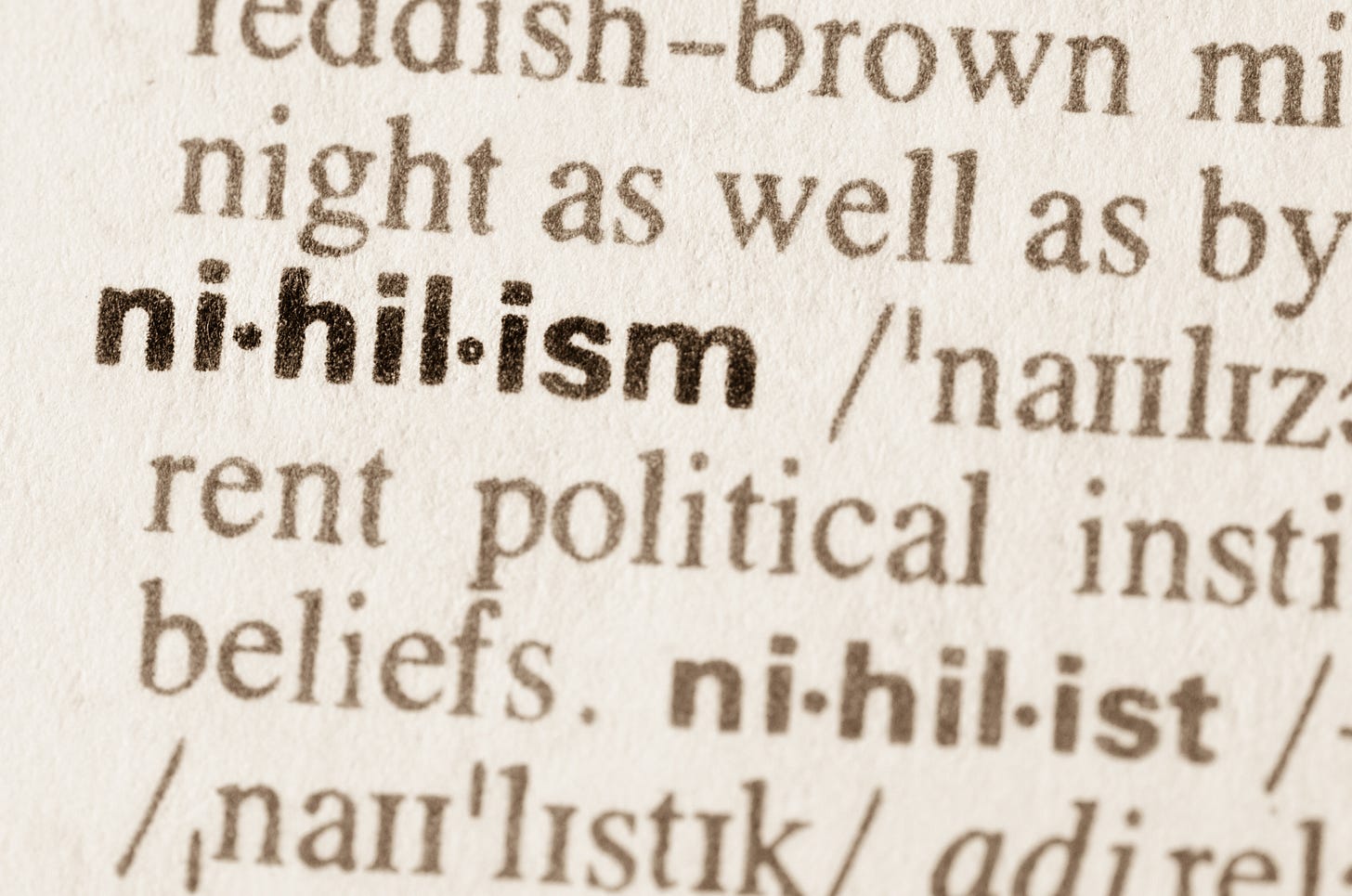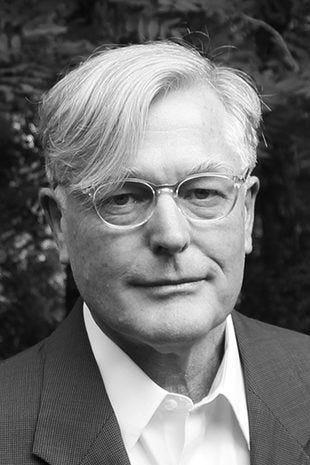The American Founding and Modern American Nihilism: A Response to David Azerrad
Part 4 of a series by C. Bradley Thompson
The American Mind is happy to play host to the important debates raised in the below essay. We do not necessarily endorse one side or another, and will, of course, invite responses — Eds.
David Azerrad begins his response to my essay on “The Decline and Fall of the Pajama-Boy Nietzscheans” with an interesting question: “If the founding was so great, then why is America in such a mess?” This is a fascinating question, but it is not, as we shall see, the most important question.
Mr. Azerrad seems to present a third way between those who assert that there is a direct line from the founders’ principles to 21st-century moral nihilism (e.g., Patrick Deneen) and those who argue that there is no connection between the founders’ classical liberalism and progressive or socialist liberalism (e.g., me). He favors what he calls a more “nuanced understanding of America’s political degeneration.” Readers may flinch at Azerrad’s suggestion that his approach is more “nuanced” than the alternatives, but they should nevertheless take his argument seriously. It is potentially a good one. Mr. Azerrad promises us nothing less than a “proper diagnosis” of our current maladies and their causes.
David Azerrad’s diagnosis of our present ills claims that there are two related ways in which “classical liberalism unintentionally facilitates the rise of modern liberalism.” The first asserts that the principles of the founders’ classical liberalism are naturally predisposed toward, or are too easily corrupted by, progressive liberalism, and the second assumes that the “creative destruction” of the classical-liberal order creates a natural class of people driven by resentment. Both claims are the flipside of the same ideological coin. In other words, classical liberalism carries the seeds of its own destruction. Mr. Azerrad is no Marxist (I assure you), but his analysis of classical liberalism and capitalism bears some relationship to Marx’s interpretation of capitalism’s internal contradictions, a theme also later picked up in different ways by Joseph Schumpeter, Daniel Bell, and Irving Kristol.
While recognizing that “modern liberalism breaks with classical liberalism in fundamental ways,” Mr. Azerrad nevertheless claims “modern liberalism does so by reinterpreting classical liberalism’s fundamental concepts.” I respectfully disagree.
Modern liberalism does much more than “reinterpret” or “radicalize” the principal concepts of classical liberalism; it rejects them entirely. To “reinterpret” or “radicalize” suggests that some core attributes are retained and carried forward while fudging at the margins or growing those ideas (this is why Mr. Azerrad can say that classical liberalism has “genetic predisposition to contract the disease modern liberalism”), but that’s not what progressive liberalism is doing with classical liberalism.
I recognize with Mr. Azerrad that progressive liberalism uses words such as “equality,” “freedom” and “rights,” but it means something entirely different by those words than was meant by the founders. In a kind of rhetorical coup d’état, the progressives kept the key words or concepts of the classical-liberal tradition but gutted their meaning. Whereas equality meant equal freedom or equal rights for the founders, the Progressives transformed its definition to mean radical sameness. Progressives such as John Dewey took the word “individualism” (which meant self-government) and subtly changed it to mean “individuality” (which meant liberation of the subjective self).
Progressive-liberal rhetoric is a form of doublespeak. The difference between commonly used classical-liberal and progressive-liberal concepts is not one of “dialect” or degree as Mr. Azerrad suggests, but of one kind. He conflates the form for the substance. Consider the following analogy. Consider a man dressed as a duck, who also walks and talks like a duck. Mr. Azerrad seems to be suggesting that just because this man looks, walks, and quacks like a duck, he must have had a duck for a great uncle!
This point must be made absolutely clear: progressive liberalism rejects entirely the core principles of classical liberalism. In the Epilogue to America’s Revolutionary Mind (titled “Has America Lost Its American Mind”), I explain how and why progressive liberalism represents a total break with the founders’ liberalism. Not only do philosophers such as William James and John Dewey reject the founders’ moral and political principles (e.g., natural rights, limited government, and constitutionalism), but they even reject their understanding of truth as knowable, certain, and absolute. In the Progressives’ world, there are no entities with fixed identities (including human nature) that can be known with certainty by the human mind, no laws of logic, no objectivity, no certainty, and, ultimately, no truth. James and Dewey rejected the traditional view accepted by American Revolutionaries that truth recognizes and denotes a relationship between an idea or a proposition and the facts of reality. For the pragmatists, there is no absolute, universal, eternal, certain truth that can be discovered and understood by the human mind.
Mr. Azerrad’s second claim is that the “great disruption and constant churning” associated with classical liberalism and capitalism “will always” create a “political market for those whose livelihoods are threatened with destruction.” Azerrad is now suggesting (contrary to what he had said earlier in his essay) that classical liberalism and capitalism are more than just predisposed toward class conflict, he is suggesting that that they predetermined toward conflict between the haves and the have nots.
Interestingly, though, the evidence provided by Mr. Azerrad to support his point does not bear fruit. It actually changes the subject. Rather than giving evidence from the revolutionary-founding period to support his claim that capitalism produces a social class driven by resentment, he quotes first Juvenal and then John Adams to the effect that commerce prosperity and peace, which in turn produce selfishness, consumerism, luxury, effeminacy, venality, and boredom. But that’s a different point, and it’s a point as old as political philosophy itself. One can find the very same concerns in Plato, Aristotle and the Bible. In many ways, this has been the great question of moral philosophy for 2,500 years. It’s not unique to liberal-capitalist societies.
David Azerrad describes my interpretation of the American Revolution as “libertarian.” I don’t think that’s quite right; in fact, I’m not sure it’s right at all. He could just as easily have called it a “Straussian” or even a “Jaffanian” interpretation, which, in fact, he implies near the end of his essay. I prefer to think of it as “none of the above.” I have done something rather different. I have written what I call a “moral history of the American Revolution,” and to that end I have developed what I call “the new moral history,” which is a new historical methodology.
Rather than evaluating my interpretation based on political labels or academic affiliations, I encourage Mr. Azerrad, whose opinion I respect, to evaluate my interpretation of the Revolution by asking one simple question: Is it true? That would require him to evaluate my argument relative to the evidence that I provide in the book (as opposed to what I say about the founders’ thought in the “Pajama-Boy Nietzscheans” essay), and then compare it with competing interpretations. If, in the end, he disagrees with my interpretation, I would encourage him to write a better book.
For now, though, I’m not persuaded by Mr. Azerrad’s “nuanced” and “proper diagnosis” of either the founder’s principles or their influence on today’s world. I am open to his argument, but he must make a better case for it.
In the end, I worry that Mr. Azerrad’s third way is no way at all. Though it may be more nuanced, it’s not that different from Patrick Deneen’s flaccid and false interpretation of American history. I do not believe it true, as Mr. Azerrad claims, that “classical liberalism has a genetic predisposition to contract the disease of modern liberalism.” This statement alone puts Azerrad in the same camp with Patrick Deneen (which is fine), but Deneen’s book has been demonstrated to be so flawed and weak as to be an example of academic malfeasance. I am not the first scholar to wonder why Deneen does not mention Leo Strauss in his book, when it’s patently obvious that he’s drawing on Strauss’s interpretation of the three waves of modernity.
There is a different way to explain how America got from the founders’ classical-liberal principles and institutions to modern progressive liberalism. I can’t repeat the argument here, but I would encourage Mr. Azerrad to read the “Has America Lost Its American Mind” Epilogue in my book as a prolegomena to any future attempt on my part to explain the rise of postmodern nihilism in twentieth- and twenty-first century America.
Mr. Azerrad concludes his essay by recognizing that my interpretation of the American Revolution, like that of Harry Jaffa before me, “may ultimately be right” on the single most important question relative to the American founding: namely, that America’s founding principles are, as I demonstrate and validate in America’s Revolutionary Mind, “true—objectively, absolutely, permanently, and universally true.” That is not to say, however, that a philosophy alien to its core principles has not corrupted America—it has! But it is only by properly understanding the great strengths and truths of our founding first that we can hope to defend and improve mankind’s last best hope!





